Thailand’s U-turn on recreational cannabis splits society, sparks anxiety and relief in both camps
Cannabis stores in Thailand say business has plunged ever since customers needed a doctor’s prescription to buy weed. But advocates for cannabis control are hoping the free-wheeling days of liberalised selling are over.
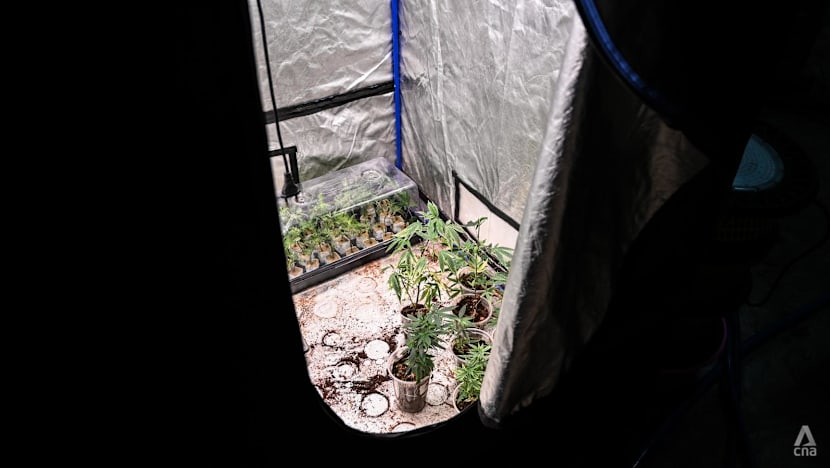
The remnants of cannabis being grown at a shophouse of a small dispensary in Bangkok. (Photo: CNA/Jack Board)

This audio is generated by an AI tool.
BANGKOK: Since Thailand changed its laws on Jun 25 mandating cannabis be sold only for medical purposes, businesses say customers have turned to underground channels, causing sales at many of the country’s 18,000 licensed stores to plunge by up to 90 per cent.
The changes – which took place with the Ministry of Public Health’s announcement in the Royal Gazette – have caused fear and confusion among customers and shaken the will of struggling small businesses to follow the rules, they said.
While cannabis is still legal, there are extra hurdles for buyers and suppliers, including the requirement for customers to have doctors’ prescriptions.
There are several valid reasons for being prescribed cannabis, including headaches, nausea, epilepsy and cancer-related pain. Patient details, including name, age, nationality, identity card number and diagnosis, must also be kept on record.
Sellers who violate that order face a maximum one-year jail term and a 20,000 baht (US$618) fine, while also having their licences revoked.
There are limitations on the amount of cannabis an individual can purchase - 30 grams, which is considered a month’s supply.
Growers must now adhere to a government certification called Thailand GACP (Good Agricultural and Collection Practices), which is aimed at ensuring cannabis cultivation meets strict quality and safety standards for medical use.
On Monday (Sep 1), the ministry announced further clarifications aimed at supporting businesses.
They include having them register on a central ministry database, allowing for telemedicine access for new customers instead of a requirement for in-store clinicians and providing training to staff to improve their knowledge and professionalism in the industry.
Critics of the new rules say they are impractical to follow, and a result of the country’s cannabis policy being held hostage by politics. Its proponents, on the other hand, say they will help to rein in an industry that has run rampant and lacked quality control in recent years.
“We want to tell tourists they are welcome to enjoy Thailand’s culture and nature — but Thailand should not be seen as a destination for recreational cannabis use,” Public Health Minister Somsak Thepsuthin told CNN in June.
The new rules help plug a legal vacuum following the legalisation of cannabis use in the country, and prevent misuse, Somsak added.
“We are not shutting down cannabis shops, but we are prioritising medical regulation,” he said.
“Revenue may dip at first, but considering the social harm caused by unregulated use, the change is necessary … responsible, law-abiding businesses will remain stable and continue operating.”
Thailand’s Ministry of Commerce estimated in a 2022 report that the cannabis industry could be worth US$1.2 billion by 2025.
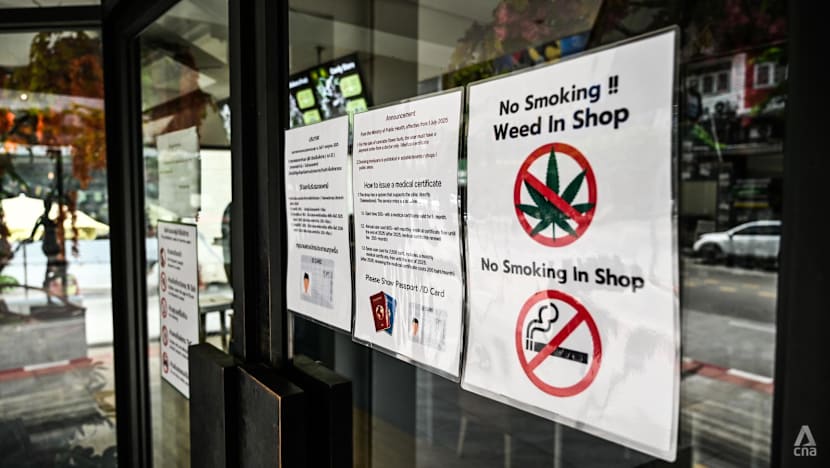
BOOM IN THE BLACK MARKET
Over the past two months, many retail businesses have reported their sales crashing, according to Rattapon Sanrak, the founder of Highland Cafe and a leading voice for the cannabis industry for more than a decade.
“Right after the announcement, sales dropped like 80 to 90 per cent across the board, because people panicked and they were not comfortable coming to the shop to buy it,” said Rattapon, who opened the first dispensary in the country when the drug was decriminalised.
For the co-owner of Bangkok Exotics Dispensary, who asked to be named only as Warittha, the situation is desperate.
Days before speaking to CNA, she shuttered one of her branches in Krabi in southern Thailand. Plans for an outlet along the trendy thoroughfare of Thonglor in central Bangkok recently fell through when she said the building owner was frightened off by the tightening rules on cannabis sales.
Her customers are also scared of the new requirements, she said. As a result, legal sales over the counter have been slashed to a fraction of what they once were.
“Anxiety and panic started to set in (the day the rules changed), and I didn't know what to do,” said Warittha, who joined the industry after cannabis’ decriminalisation.
She classifies most of her clients as “high-grade customers”, such as high-earning Thai professionals who like to buy in bulk and are typically reluctant to register on a database of prescribed users even though they are not breaking the law.
“These people do not want to reveal that they're using. They want to keep it low-key, because in our society, using cannabis still has a pretty bad image.”
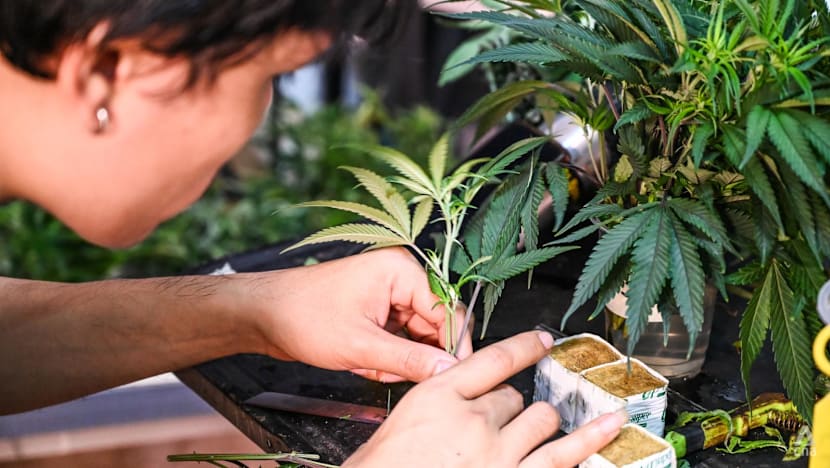
To keep afloat, businesses say they have been forced to accept buyers without a prescription. They will also routinely apply for medical prescriptions on behalf of buyers without them ever having consulted a doctor.
Based on his conversations with a vast network, Rattapon estimated that 90 or 95 per cent of shops in Thailand would sell to survive without proper paperwork being done.
“It is completely forcing people to go underground, to do some illegal stuff, because they have to survive. They have to feed their families. People have no choice. They’ve invested a lot of money in the business already,” he said.
Tourists have also shown reluctance to be registered on a database of cannabis users, impacting the likelihood of them buying through legal channels, he said.
“We cannot ask a customer, ‘Hey, you go see your doctor and then come back to buy it.’ They won't do that. It's not happening,” he said. Rather, they will simply search on Google, go to an online store or go to the shop nearby that will sell to them, he added.
One user who went by the nickname “Book” said he believed many Thais, just like him, are simply bypassing proper outlets in favour of cheaper, more expedient weed, online or through social media platforms.
“The main reason is the price,” Book told CNA. “In a shop like on Khaosan road, maybe the price starts at about 300 baht for one gram. Underground, it starts at about 50 or 80 baht, and for me, the quality is good.”
Anawat, an underground grower and seller, has mostly given up on trying to make his “hobby” a valid business. He produces cannabis oil cartridges that work similarly to vapes to help treat his severe asthma and sells 10 to 20 devices to a small network on the black market each month.
“You cannot make money above ground,” he said.
Warittha, who grows cannabis plants on the upper floors of a shophouse she rents, has decided to cut down her mother plant, which is typically used to produce clone cuttings and provide a consistent supply of new plants that have the same characteristics.
Having her grown cannabis certified as GACP is an even steeper challenge that requires strict hygiene protocols and expensive scientific testing, she said.
“I don't know how long we can survive doing this,” she said.
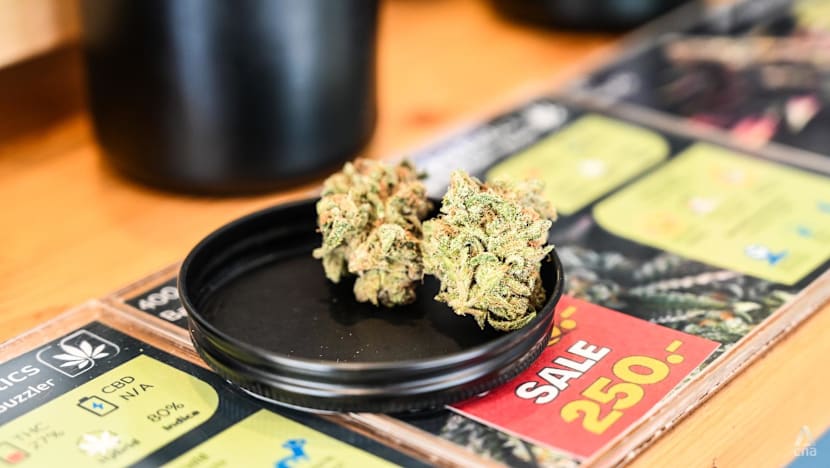
“NEW SHERIFF IN TOWN”
Those pushing for greater regulation support the government’s move.
“Cannabis in Thailand is still legal, medically. We're not a country to get you high. We're the land of smiles, but we're not that kind of smile,” said Tom Kruesopon, a businessman who was once a key player in cannabis decriminalisation but is now pushing for tighter control due to the ways he has seen the industry evolve over the past few years.
He said that it is not reasonable to have cannabis stores opening up in every corner of the country, unregulated.
“If stores want to continue to sell cannabis to people who need it, feel free to do it, just follow the legal guidelines. It went from the wild west to now, there's a new sheriff in town,” he said, referring to Minister Somsak, who has been leading efforts to crack down on unregulated cannabis use.
Thailand should not back down from wanting to rid the market of unregulated products, according to Tom.
He labelled calls to maintain the free-wheeling days of liberalised selling a “childish argument”.
“Would you not want to ensure that the people who are taking cannabis are getting quality products rather than products that are tainted?
“(Right now) you don't know what you're smoking. You don't know what you're inhaling. You have pesticides. You have contamination,” he said.
For cannabis rights activist and entrepreneur Kitty Chopaka, the central problem is government policy being made on the run.
There is political division between the ruling Pheu Thai party, which has campaigned on returning cannabis to the country’s narcotics list, and Bhumjaithai Party, which quit then-Prime Minister Paetongtarn Shinawatra’s governing coalition over her leaked phone call with former Cambodia Prime Minister Hun Sen on border tensions.
Bhumjaithai has deep ties to the industry and wants to see a softer control bill. The party supports cannabis use solely for medical purposes but wants licensing tiers, advertising bans, age limits and prescription oversight.
“We cannot deny that this is all political, because Thailand's policy does not move with logic,” Kitty said.
“Whoever's in power, or whoever has the most money or the biggest stick, will be able to do as they wish with not just cannabis, but any political topic in Thailand,” she said.
Businesses want regulation and they want certainty, she said. But the playing field must not exclude small operators burdened by rising administrative costs and impenetrable barriers to entry, she said.
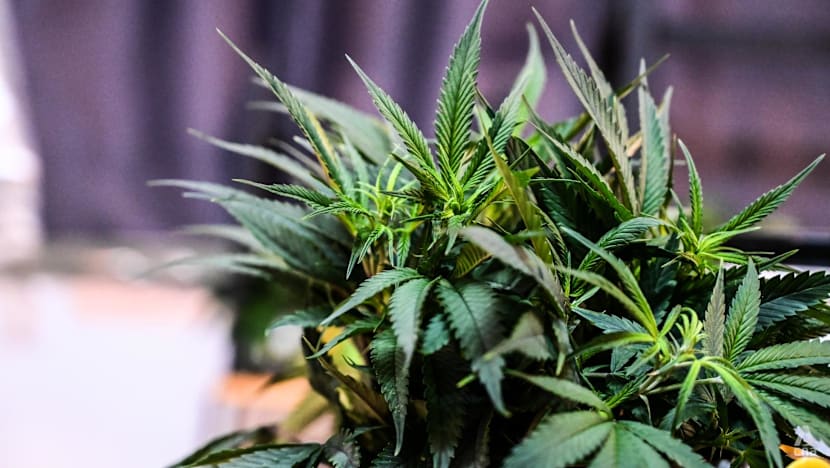
The future of the industry remains unclear, with posturing around a new prime minister to be decided this week having the potential to once again have influence over cannabis rules.
The People’s Party - which has emerged as a kingmaker in supporting a new leader - has largely stayed out of the debate in recent times, but has previously shown support for medical-only use of the drug.
While Minister Somsak has previously said that the drug “will definitely be put back” on the narcotics list, Tom said he believes that the government is willing to seek a middle ground with its new raft of rules for the next few years.
Meanwhile, the industry is restless. Rattapon is involved in a potential class-action lawsuit involving hundreds of plaintiffs, considering demands for compensation for what they call the sudden, punitive shifts in cannabis policy that have disrupted business.
They have not made court filings yet.
The potential of criminal liability for tens of thousands of people working in the cannabis sector, which could occur if it was re-criminalised, is enough to have everyone constantly on edge, he said.
“This war has ended already, and we should not go back to that.”
















